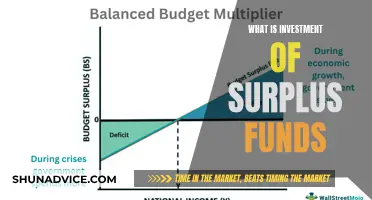
Hedge fund managers are investment managers who make daily investment decisions for a hedge fund. They decide how to distribute invested money and manage the fund's level of risk. They are motivated to be successful as they get paid a performance fee, which can be up to 20% of the fund's profits.
Hedge funds are considered alternative investments and are often regarded as risky. They are not subject to the many restrictions applicable to regulated funds and can use leverage and more complex investment techniques. They can invest in a wide range of assets, including stocks, bonds, real estate, commodities, currencies, derivatives, and even art.
Hedge fund managers employ various strategies to generate positive returns, including global macro, directional, event-driven, and relative value (arbitrage). These strategies involve investing in debt and equity securities, commodities, currencies, derivatives, and real estate.
While hedge funds can provide high returns, they also come with significant risks and high fees. As such, they are typically only accessible to accredited investors or institutional investors with a high net worth.
| Characteristics | Values |
|---|---|
| Investment types | Securities, real estate, art, currency, land, stocks, derivatives, commodities, cryptocurrencies, patents, fine art, and more |
| Investment strategies | Hedging, shorting, leveraging, long/short equity, global macro, relative value, activist, fixed-income, event-driven, distressed debt, credit arbitrage, and more |
| Investor types | Institutional investors, pension funds, insurance companies, and wealthy individuals |
| Investor requirements | Accredited investors with a net worth of over $1 million, make over $200,000 a year, or be a licensed investment professional |
| Fees | Management fee (1-2% of fund's net asset value) and performance fee (20% of fund's profits) |
| Risks | High-risk, illiquid, volatile, complex, and alternative |
What You'll Learn

Real estate
Another way hedge fund managers invest in real estate is by acquiring actual properties. They may purchase properties outright, oversee their management, or engage in real estate development projects, sometimes in partnership with other firms. By doing so, they obtain physical assets that can be developed to generate revenue. This approach allows them to have more control over the assets and potentially generate higher returns.
It is important to note that investing in real estate through hedge funds is considered high-risk due to the aggressive investment strategies employed. The minimum investment amount is usually high, typically starting at $100,000 and going up to $1 million or more. Hedge funds are also relatively illiquid, with investors' capital tied up for long periods, and there is a possibility of significant losses if the fund underperforms.
Overall, real estate hedge funds offer a unique opportunity for investors to access the real estate market, providing potential for high returns and portfolio diversification. However, it is crucial for investors to thoroughly research and understand the risks associated with this type of investment before committing their capital.
Trust Fund Investment: Is It a Smart Financial Move?
You may want to see also

Art
Some of the top-performing art investment funds include Artmeundi, a global art fund management firm with a diverse range of funds and a strong track record; Anthea Art Investments, a Swiss advisory boutique specialising in post-war and contemporary art; and The Fine Art Group, a firm offering a range of art investment opportunities and financial services.
Hedge Fund Managers: Where They Invest and Why
You may want to see also

Currency
Hedge fund managers may also employ foreign exchange strategies, trading currency pairs such as the US dollar versus the euro. They use technical and fundamental analysis to determine when to buy or sell, aiming to profit from price inefficiencies and imbalances in the foreign exchange market.
Additionally, currency risk management is an important consideration for hedge fund managers, especially those with foreign equity fund exposure. Fluctuations in exchange rates can significantly impact investment returns, and hedging strategies can be used to minimise this risk. For example, a UK investor investing in a US equity fund without currency hedging is exposed to both the market risk of US equities and the fluctuation of the exchange rate between the pound and the dollar.
Overall, currency is a significant aspect of hedge fund investments, and managers employ various strategies to mitigate risks and optimise returns in the dynamic foreign exchange market.
Invest Smartly: Direct Mutual Funds Guide
You may want to see also

Debt-based investing
- Bonds: Hedge funds may invest in various types of bonds, such as government bonds, corporate bonds, or high-yield bonds. By lending money to governments or companies, hedge funds can generate returns through interest payments and capital gains. The risk level of these investments depends on the lending duration and the creditworthiness of the borrower.
- Distressed Debt: Hedge funds may purchase debt from companies that are insolvent or in financial distress at a discount from existing lenders. This strategy aims to identify debt securities trading at a larger discount than their intrinsic value, with the potential for a turnaround. Distressed debt investing can lead to significant returns through short-term price recoveries or "loan-to-own" strategies, where the debt converts into equity.
- Leveraged Loans: Hedge funds may provide loans to companies, often using borrowed money themselves. This strategy allows funds to amplify their returns but also increases the risk of losses.
- Derivatives: Hedge funds may use derivatives, such as options and futures, to hedge their positions and minimise risk. For example, they may buy put options or sell stocks short to protect their investments from market downturns.
It is important to note that debt-based investing carries significant risks. These include interest rate risk, credit risk, and liquidity risk. Hedge funds that invest in debt instruments may experience substantial losses if interest rates rise or if borrowers default on their debt obligations. Therefore, investors should carefully evaluate the risks associated with debt-based investing before allocating their capital.
Indexing in Mutual Funds: Abusive or Strategic?
You may want to see also

Derivatives
Hedge funds invest in derivatives because they offer asymmetric risk. Derivatives such as futures, options, and swaps are considered risky investments. They are often highly leveraged, which means that they can amplify returns but also amplify losses.
Hedge funds view derivatives as having asymmetric risk because the maximum loss is much smaller than the potential gain. For example, a hedge fund manager might purchase a call option on 1,000 shares of a stock that they expect to rise rapidly. This gives them the option to purchase the stock at today's price at any time before a specified future date. If the stock spikes, they can exercise the option and make a quick profit. If the stock remains flat or collapses, they simply let the option expire, and the loss is limited to the small premium paid for it.
While derivatives can be valuable tools for hedge fund managers, they have also been criticised. Warren Buffett described derivatives as "financial weapons of mass destruction". In the lead-up to the 2008 financial crisis, derivatives contributed to the financial problems that almost brought down the entire global financial system.
A Guide to Investing in ICICI Mutual Funds
You may want to see also
Frequently asked questions
Some common types of hedge funds include:
- Global macro hedge funds
- Equity hedge funds
- Relative value hedge funds
- Activist hedge funds
Some well-known examples of hedge funds include:
- Bridgewater Associates
- Renaissance Technologies
- AQR Capital Management
Hedge funds employ a variety of investment strategies, including:
- Long/short equity strategy
- Global macro strategy
- Relative value arbitrage strategy
- Event-driven strategy







